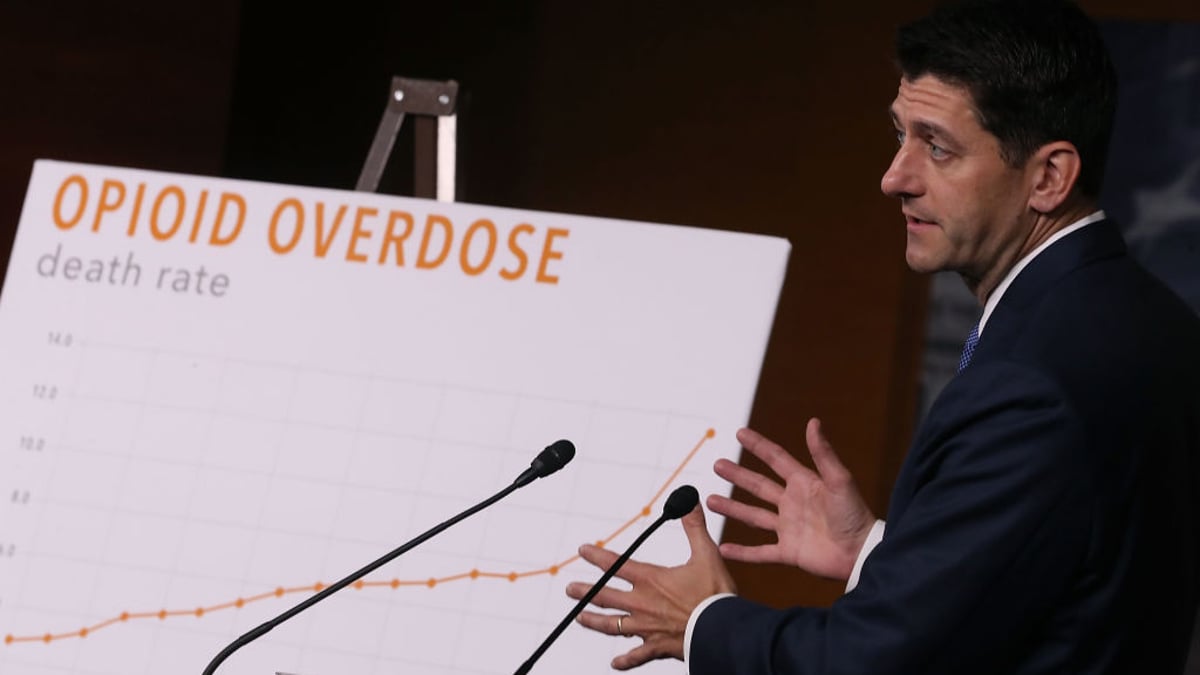Like all tragedies, America’s ongoing opioid crisis is a big topic for Hollywood. Movies and shows about one of the country’s biggest healthcare issues have been doing well, whether it’s Hulu’s well-regarded Dopesick, or Netflix’s suspiciously similar Painkiller. Now, the Orange is the New Black streaming giant is back with a somewhat based-on-a-true-story tale called Pain Hustlers, starring Emily Blunt, Chris Evans, and Catherine O’Hara.
While the talent shines, what we’re not too certain about is how true this “true story” really is. This is especially when it comes to Blunt’s character Liza Drake, given how loosely the entertainment industry slaps the label onto projects. So who is Liza Drake?
We present to you the actual true story of Emily Blunt’s character from Pain Hustlers, explained!
What is Pain Hustlers about?
Pain Hustlers is based on a book by investigative journalist Evan Hughes called The Hard Sell, which in turn expands his own New York Times article entitled “The Pain Hustlers.” The film focuses on single mom and high school dropout Liza Drake (Blunt) who manages to snag a job at a failing pharmaceutical start-up in muggy, staid Central Florida.
With a knack for sales, she soon rises through the ranks and becomes fabulously wealthy. However, despite knowing she’s offering her young daughter a better shot at life, her morals begin to get in the way of her work, and she finds herself at the center of a web of criminality that has devastating and deadly consequences.
What was The Hard Sell about?
If we look at Hughes’ book, we can gather some more plot clues. The company that Drake winds up at will be Insys Therapeutics, founded by John Kapoor (Andy Garcia), who’d already made a good amount of money in the pharmaceuticals sector. Kapoor, a brilliant scientist with a born capitalist’s predatory brain, had developed a novel formulation of the ultra-potent opioid fentanyl, which he called “subsys,” and he was ready to live the American dream and milk it for all the profit he could, even if people died in the process.
He put together an ambitious and desperate team, who were willing to do and say anything to get a sale, and knew to target doctors with loose moral values. Although subsys had only been approved for cancer patients during the worst of their agony, Kapoor and his leadership team pushed the drug to be used more widely, lying to insurance companies and banking billions in the process. However, insiders eventually blew the whistle, leading to a lengthy and drama-filled legal battle.
It seems likely that Drake will be an early sales recruit with moral doubts, who eventually becomes a force for good after rising through the company and realizing the evil she’s doing. The trailer seems to suggest the film will focus on how the money poured into Insys, and how that created an environment where nobody questioned what was going on. However, despite a fast-approaching release, not much detail about the film’s plot has been revealed, so this is all speculation.
Is Liza Drake real?

In short, Emily Blunt’s character Liza Drake isn’t real. However, the fictional character seems to be an amalgamation of various real-life insiders at Insys whom Hughes spoke to for his reporting.
Many of the people Kapoor hired were women in their 20s and 30s with a small amount or no experience with pharmaceutical sales, and as we know, the character is a high school dropout, thus she fits the bill.
How much of Pain Hustlers is based on a true story?

Because of how few plot specifics are publicly known at this point, it’s hard to say how much of the film will be true, and how much will be completely fabricated. We know Drake isn’t real, but it’s almost certain that they took excerpts from Hughes’ book that dealt with those involved, and used those people for inspiration.
The meteoric rise and devastating fall of Insys Therapeutics is a compelling story without embellishment. As The Big Short and Dumb Money showed, stories about scandals in massive industries are always a big draw.
Unlike Netflix’s other attempt to tackle this topic, which was in a lot of ways a worse version of Hulu’s production, they have a unique story here. It wasn’t just pushy salespeople and corporate lies to external stakeholders that Insys was engaged in. Still, also Insys demanded loyalty from doctors, going so far as to set up a fake lecture circuit where physicians would talk to Insys employees and their own families in exchange for massive sums of money — a feature touched on via Michael Keaton’s character in Dopesick, but possibly delved into deeper here.
What happened to Insys Therapeutics?

Thankfully, the story does end with some version of justice. After a series of raids by federal agents, Kapoor was taken into custody and many of its former top execs were charged with racketeering offenses. A number of the doctors who’d been involved in the fake speaker program were also charged with a plethora of crimes, including insurance fraud and illegally prescribing opioids.
A year after the NYT story by Hughes came out, Kapoor and the four executives charged alongside him were all found guilty, and soon after Insys filed for bankruptcy.
However, because it’s America, two months later (in September 2019), the company was allowed to sell its drug to another pharmaceutical company named BTcP Pharma, which promised to play by the rules and only prescribe it to cancer patients. We can only hope they do.

